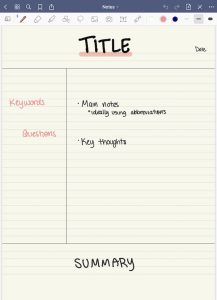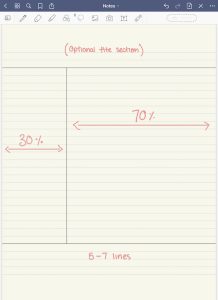Fact-check: Which answer is correct?
Advice from research:
- Always type rather than handwrite your notes – it’s more efficient.
- Visualise information and ideas whenever possible. This makes it easier to understand them later.
- Avoid making notes in the materials you get from your lecturers.
- Make your notes as detailed as possible.
- Combine as many different media and methods (digital and analogue) as possible in your notes.
You will find the solution at the bottom of the post.
Why taking notes is important
You’ve probably wondered about the benefit of taking notes. It can be annoying and exhausting to note down everything in a course. Often you can barely keep up, and the notes you take may seem useless. Wouldn’t it be better to just focus on what is being said? Research has clearly shown that this is not the case! Taking notes increases your attention and helps you identify what’s essential.
If you want to take effective notes, keep the following in mind:
First of all: Making notes is not a technique you use mechanically but a strategy that serves a deliberate and purposeful aim. It thus makes sense to pay particular attention to the following:
- Prepare for taking notes
-
- Evaluate the learning situation and decide whether and in what form you need to take notes. What documents are available? How detailed and organised are the lecturers’ materials? How much do you already know about the topic? What exactly are your expectations: Why are you attending the course in the first place / why are you reading a particular book? What do you want to learn?
- Think carefully about where you take your notes. Directly in the lecturer’s materials or on separate sheets or files? We recommend the former approach if the materials are well structured and offer plenty of space for your own notes. The latter approach works well if you want to take more detailed notes. Think carefully in advance whether you want to handwrite or type your notes. Always have the material you need ready.
- Filter out what’s essential
Follow the content while you take notes and distinguish between essential and non-essential ideas. Structure your notes by using keywords and aids such as colours, abbreviations, numbering, sketches, etc.
- Edit your notes
Once you’ve taken notes, it doesn’t mean you’re done. Look them over and refine them so that they become more useful.
How to take great notes:
Take notes systematically
There are simple tips on efficient note-taking to help you accurately recall what you learned at a later time.
Try to use the same method as much as possible, even if it’s imperfect. The important thing is that you are well acquainted with it and have a routine. Having good note-taking habits will save you a lot of time.
The Cornell Method can help you to organise your notes and prepare for exams effectively. The method was invented by Walter Pauk at Cornell University (New York) in 1949 and is still very popular at American universities because it is so efficient, especially when following up on your coursework.
How does it work?
Create margins at the top, left and bottom of your note sheet. The notes go in the “main” area (large box on the right), where you write down everything you want to remember and that you think will be relevant for the exam. The left and bottom margins are for following up: On the left, write down your questions and record important keywords; at the bottom, summarise the content of your notes in two to four sentences (or a mindmap). At the top, enter the date and course name so you can later assign the accumulated notes to a course. If you are taking notes digitally, remember to give the document a meaningful name.
Figures: https://medium.goodnotes.com/
What are Cornell notes?:
How to use Cornell notes:
Tips for effective use of the Cornell Method:
- Keep only the most important information.
- Outline your notes and don’t forget to give them titles.
- Leave space for the headline.
- KISS (keep it short and simple) it: Use keywords instead of full sentences.
- Separate the topics (separator lines or new page).
- Immediately jot down questions that come to mind.
- Revise your notes as promptly as possible.
- Delete unnecessary information when revising.
Which is better: Writing by hand or typing?
In the wake of digitalisation, you will take more and more notes electronically, which has numerous advantages over working on paper. You can edit and elaborate on electronic notes as you like, correct errors immediately, or delete sections easily. This also allows you to manage your content efficiently and clearly, and the search and sort functions let you find what you need at any time.
But beware: Researchers have found that electronic notes lead to poorer performance in studies compared to handwritten notes. Why? Students who type their notes write down more but think less about the content and usually note down verbatim what they hear. While this makes easier to recall facts (e.g. “When did Frederick Winslow Taylor establish the principle of process control of workflows?”) but harder to think conceptually (e.g. “What does Taylorism mean in the digital age?”). Students who handwrite their notes write less but think more deeply about the content and thus perform better conceptually, according to studies. In other words, handwriting helps you to think!
Digital notes vs. handwriting notes (which should you do?):
Typing vs. handwriting: Which is better for your memory?
Try out and discuss:
- What is your note-taking method? What do you find particularly difficult? Do you have your own system? If so, what is it? How well does it work for you?
- Handwritten or digital notes – which method do you prefer? Why?
Resources:
Müller, P. A., & Oppenheimer. D. M. (2014). The pen is mightier than the keyboard: Advantages of longhand over laptop note taking. Psychological Science, 25, 1159-1168.
Cover picture: «taking note» by Chanut is Industries from the Noun Project
Correct answer of the Fact-check is No. 2


